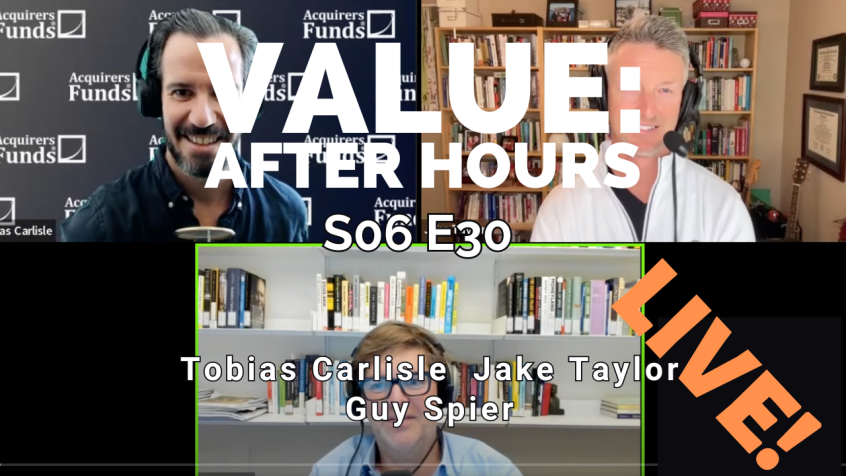During their recent episode, Taylor, Carlisle, and Guy Spier discussed Why Investing Is an Infinite Game: Lessons from Warren Buffett. Here’s an excerpt from the episode:
Jake: [crosstalk]
Tobias: Did you read that book, Infinite Games, I think it’s Carse, isn’t it?
Guy: Carse. James Carse.
Tobias: Carse.
Guy: Finite and Infinite Games. I had copies of that book here. I was sending it out to everyone. And then, Simon Sinek, who read that book, wrote a book that in many ways explains the ideas better, slightly less mathematical, slightly more useful for business leaders. It’s just a phenomenal game. Just in case anybody listening to this, you can look it up. There are finite and infinite games. Finite games are games where there’s a set of rules, there’s a winner, there’s a loser. It usually is played for a finite time in a finite space, like a soccer game, like a chess match, like all sorts of things. The distinction is made between that.
And infinite games, infinite games tend to have ill-defined or no rules, ill-defined battle space or game space, both in terms of physical dimension and in terms of time. The bottom line is, the most interesting games are infinite games. The Cold War is a classic example of an infinite game. In an infinite game, there are no winners or losers. Usually, one of the people decides to drop out first. So, effectively, in the Cold War I, as Niall Ferguson calls it now, because we’re now in Cold War II, Russia decided to drop out. But the rules were undefined. The battle space was ill defined. It could have been in outer space. It could have been nuclear weapons. It could have been domino effect in Southeast Asia.
And so, investing is an infinite game. Life is an infinite game. This is something that Warren Buffett figured out. And so, the kind of personality that I am, just to try and make this a little bit about investing, because we are all investors, is I love finding moves that I can make in the world around investing that have multiple layers of positive results in them. And so, they get me a short-term benefit, and they also get me a long-term and eternal benefit, possibly. Actions where there’s a short-term benefit but a long-term loss. And by the way, Luca Dell’Anna, if you haven’t come across him, has got a book called Long-Term Games, which is wonderful.
So, I just give you one example of one that I have found that is just super fun for me. I don’t know where it will go, so I have a position. I’m not supposed to talk my book, but I guess I am. I have a position– I won’t name the name of the company. If somebody’s interested, they can go look it up. But I have a position in Indian Credit Rating Agency. They’re not a global credit rating agency. They’re an Indian homegrown agency, locally controlled. There’s Indian credit rating agencies that are controlled by Standard & Poor’s. There’s another one controlled by Moody’s. There’s another one controlled by Fitch. This one is local homegrown.
India’s not very happy with its sovereign credit rating. India’s got a sovereign credit rating of BBB-. Many people, including myself, think that that’s preposterous. There’s this opportunity for, in this case, the credit rating agency that I own– I’ll say the name CARE Ratings to potentially– Well, they’re actually, I think, now authorized to issue sovereign ratings, so they could rate sovereign bonds, including India’s sovereign bonds. So, there’s a business plan about how that might happen. It’s not going to happen in year, but maybe over 2030, it changes the structure of the global ratings industry. Instead of having three, there’ll be four. Instead of all of the three global ratings agencies having headquarters in London/New York, Whitman, Old World. The global south will have a ratings agency based in India that will be rating people.
So, merely talking about that to you now increases the probability of that happening. And then, I discovered actually the company, if I’m not mistaken, would be willing, interested, or the management of the company would be enthusiastic to get the right kind of director in place who could help expand the awareness of their ratings capabilities and potential clients, somebody who’s both deeply rooted in India and is Indian, but is also a global international person, maybe a former diplomat, maybe a former prime minister, maybe a former head of a major bank. And so, then, I realized that it would be great to find that director. But even asking around for that director, even talking on this call about this potential director, it’s fun short-term and it’s fun long-term.
I’ve developed a list of people. Once I have the right package together, I’m going to be writing to them and saying, “Would you like to be considered as a potential director for CARE Ratings?” Even if they have no interest, it will still be positive. So, that’s really, really fun. That’s both the short term and the long term, the short-range tactical move and the strategic move is a positive.
You can find out more about the VALUE: After Hours Podcast here – VALUE: After Hours Podcast. You can also listen to the podcast on your favorite podcast platforms here:
For all the latest news and podcasts, join our free newsletter here.
Don’t forget to check out our FREE Large Cap 1000 – Stock Screener, here at The Acquirer’s Multiple:



